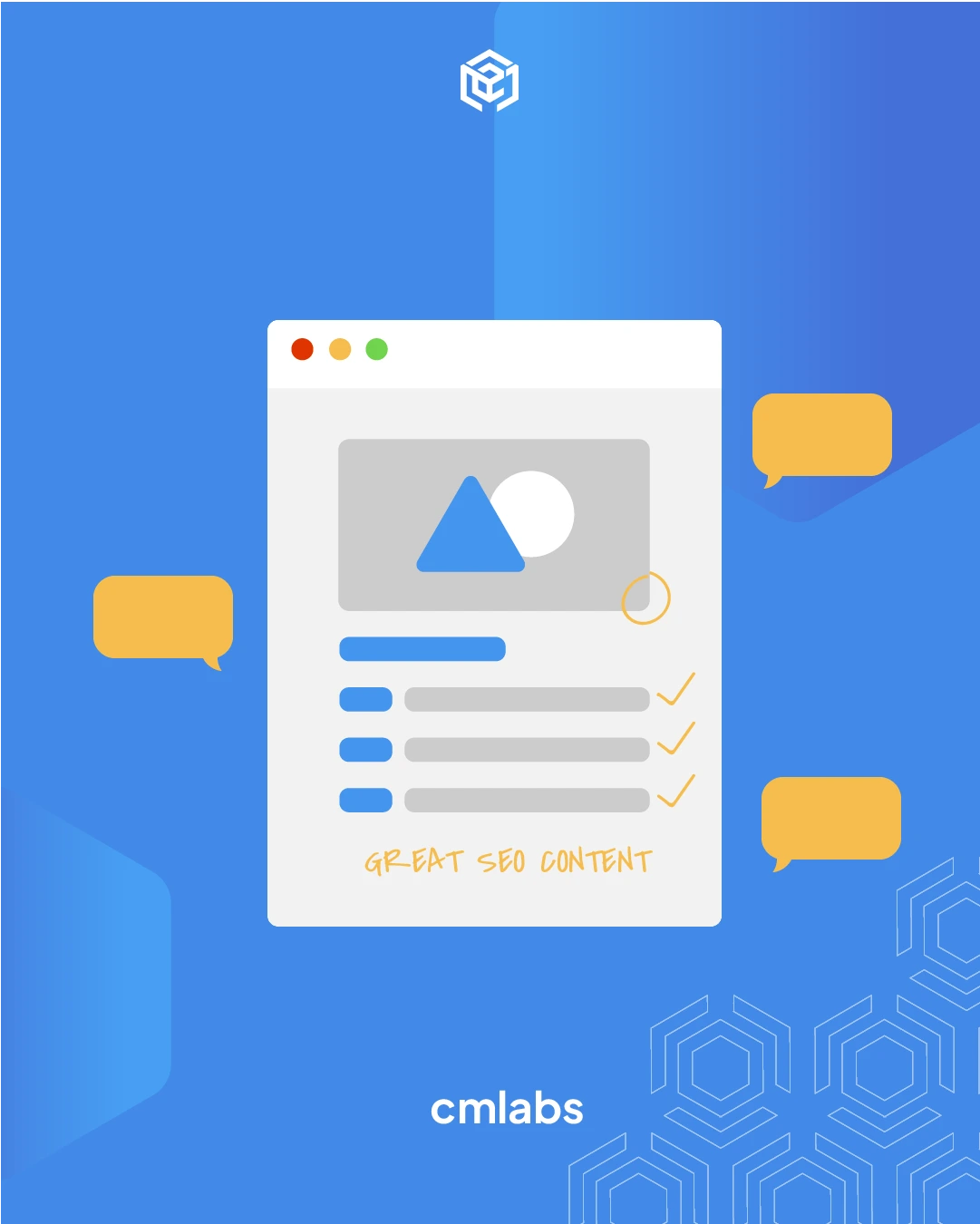We use cookies
This site uses cookies from cmlabs to deliver and enhance the quality of its services and to analyze traffic..
SEO SERVICES
Conduct in-depth technical website audits, strategically develop website projections, and increase your website authority.
ASO SERVICES
Elevate Your App’s Presence with Our Expert ASO Services – Boost Visibility and Drive Downloads!
WRITING SERVICES
We offer a variety of writing services to suit different business necessities. Reach broader audiences or lead specific industries? We've got you covered!
SEOlutions
A unified source of truth!
SEO & Digital Maternity Solution
SEO & Digital Maternity Solution: Leverage Cross-Platform Insights to Elevate Your Strategy with Expert Consultation
SEO & Digital Maternity Solution
Data Solution options:
Starting from Rp200 mio
Reinventing how a company get creative treatments
A new way to get your creative needs done. Agile team, efficient cost, and expedient way in a flexible yet scalable subscription plan!
Creative-as-a-Services
CaaS package options:
Based on Subscription
Pioneer in digital marketing software powerhouse
We’re excited to unveil our new range of Tech Solutions designed to drive your digital success. Whether you’re looking to enhance your website’s performance, streamline your tech stack, or unlock deeper insights from your data, we’ve got you covered.
Starting from Rp250 mio
Our Clients
Research and innovation center for digital transformation
Digital marketing combines technical skills and business knowledge at every stage. For marketing teams, improving budget management efficiency is crucial, as time is an invaluable resource that should be used wisely. At Sequence, we are dedicated to empowering you to optimize efficiency and strategic planning, ultimately enhancing the impact of your digital marketing efforts.
Subscription-based (IDR1,800/keyword)
Our Clients
BeyondSEO
References
SEO Tools for Webmasters
SEO Tools for Writers
SEO Tools
FIND THE SUITABLE PARTNERSHIP FOR YOUR COMPANY
Check out which cmlabs partnership program suits your company
WHITE LABEL SEO
for CorporateYour company is granted exclusive partnership rights to provide SEO services to our important clients, and we will provide a dedicated backend team to support your efforts.
AFFILIATE PROGRAM
for BizdevA new affiliate program is being introduced for skilled marketers and individuals with strong networks, offering commissions of up to 7% for generating profits independently.
DIGITAL AGENCY
for Marketing Partnerscmlabs is an essential partner for digital agencies, providing a unique selling proposition in Search Engine Optimization (SEO).
BACKLINK PARTNERSHIP
for Media / BloggerWe have a vast database of bloggers and media outlets across Indonesia, categorized by region and media type, giving our clients an edge in managing their media and SEO activities.
OFFICIAL TRAINING
We provide ongoing professional development and support to SEO professionals to ensure they are equipped to meet market demands.
JOIN AS CONTRIBUTOR
for Content WriterGreat opportunity for SEO Writers around the world. T&C applied!
ACADEMIC PARTNERSHIP
Through partnerships with universities in Indonesia, cmlabs has helped align academic curricula with industry demands.
Partnership
Sector & Industries
Tell us your SEO needs, our marketing team will help you find the best solution
As an alternative, you can schedule a conference call with our team
Schedule a Meeting?Contact
Survey
We use cookies
This site uses cookies from cmlabs to deliver and enhance the quality of its services and to analyze traffic..
Last updated: Mar 31, 2024

A compiler is a software designed to translate or convert source code into object code that can be understood by a machine.
In short, this software serves as a crucial bridge connecting programmers with the computer hardware.
With such software tools, high-level programming languages can be transformed into machine language, making it easier for computers to process. This process is commonly referred to as compilation.
In general, this software is responsible for assisting programmers in converting program code. However, it also serves several other functions, including:
After understanding what is a compiler and its functions, you may find that the concept is similar to something called an interpreter. However, both of them have quite significant differences, such as:
Essentially, the operation varies depending on the method used to analyze and convert the source code. However, regardless of the approach, here are some common stages you need to know:
In this stage, the compiling software is responsible for reading the source code, analyzing the data structure, and interpreting the meaning of the code. The stages include:
After the analysis process is complete, the next phase is the synthesis phase. In this stage, this compiling software will generate two types of code: object code and intermediate code.
Upon completion of the synthesis phase, the compiler then generates an executable file that can be directly run by the computer.
In general, this software can be categorized into four different types. They are:
This type can generate the latest version of specific software, making them widely used for improving and optimizing performance.
This type is suitable for developing cross-platform software as it can produce abstract code that can be used on different operating systems from the parent platform itself.
Transcompilers can convert source code originating from a High-Level Language (HLL) into another programming language (non-machine code).
Decompilers can convert machine code into program source code. This type is commonly used to support learning practices related to programming.
Once you understand what is a compiler, its functions, types, and how it works, it's essential to know which programming languages can utilize this software. Here are some of them:
C++ is a programming language that allows developers to write code with a high level of control while maintaining flexibility. Some commonly used software for C++ are Visual C++ and GCC.
Java also uses a compiler as part of its software development cycle. As one of the most popular and secure programming languages, Java employs specific software to transform program code into bytecode. Some compiler examples in Java are OpenJDK, IBM SDK, and Oracle JDK.
Visual Basic is a programming language for rapid application development. When using Visual Basic, the source code is converted by the Visual Basic Compiler (VBC).
This programming language is commonly used for developing Android applications due to its object-oriented nature. Some suitable compiling software for Kotlin are Studio and the Kotlin Compiler.
Pascal is a suitable programming language for creating applications with a structural programming language. If you are using Pascal, the required software is the Pascal Compiler.
WDYT, you like my article?
Couldn't find result for "Mulki" try to search with different keyword
Suggestion:
Tell us your SEO needs, our marketing team will help you find the best solution
As an alternative, you can schedule a conference call with our team
Schedule a Meeting?



cmlabs Jakarta Jl. Pluit Kencana Raya No.63, Pluit, Penjaringan, Jakarta Utara, DKI Jakarta, 14450, Indonesia
(+62) 21-666-04470These strategic alliances allow us to offer our clients a wider range of SEO innovative solutions and exceptional service.

Psst! Hey there, SEO Stats and Tools SEO company! If you've ever planned of conquering the Vietnam market, you've come to the right place!